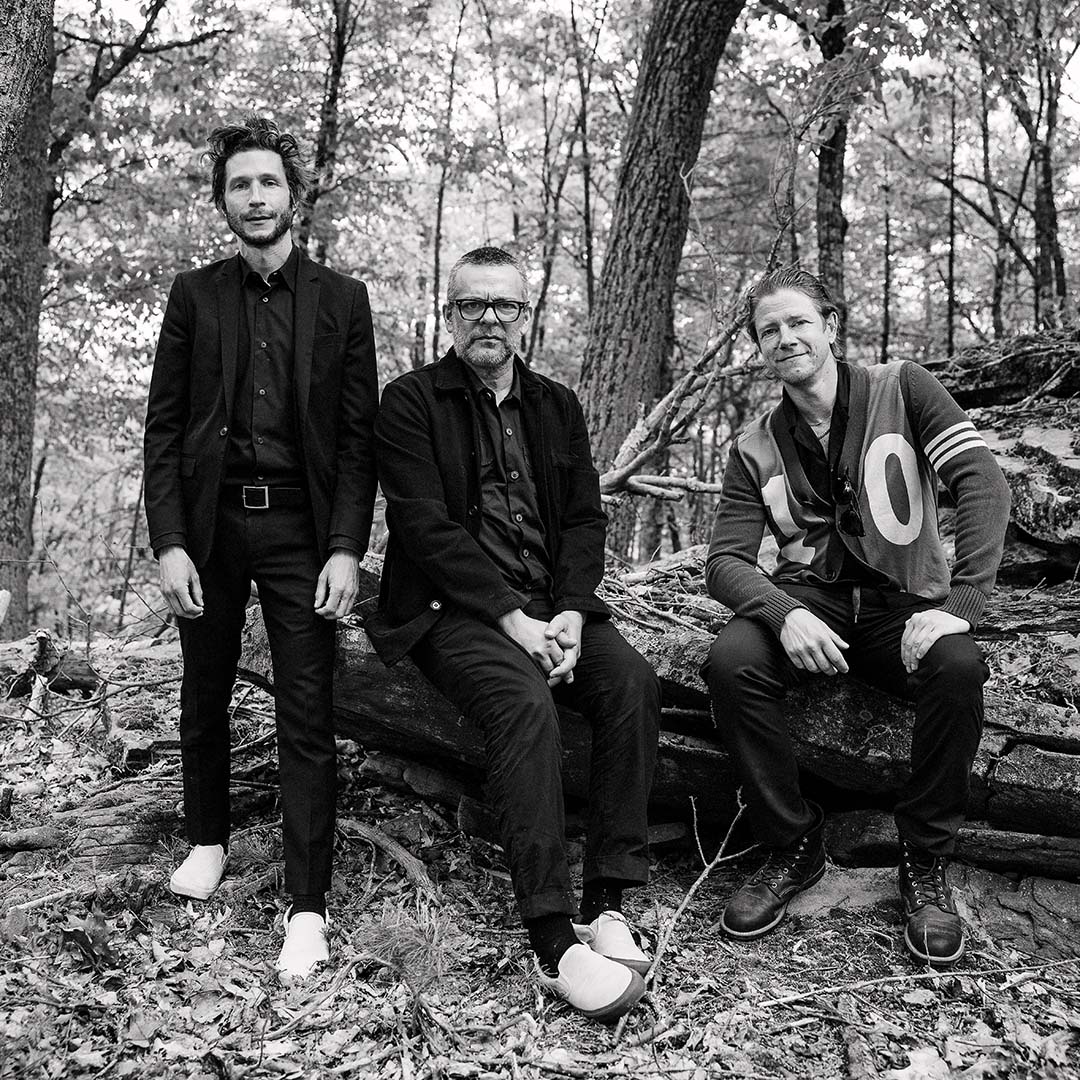- Music
- 23 May 23

Our June Gig Special continues! Kraftwerk, Interpol and Róisín Murphy are just the tip of the iceberg when it comes the stellar line-up at the Trinity Summer Series. Plus, Will Russell reflects on the pioneering genius of electronica legends Kraftwerk...
Since kicking off in 2017, the Trinity Summer Series has proven a hugely popular addition to Dublin’s gigging calendar. A truly glorious spot to enjoy some music on a summer’s evening, Trinity will host another cracking series of gigs throughout late June and early July.
First up on June 26 are Scottish pop-rock maestros Texas. Fronted by the hugely charismatic Sharleen Spiteri, the group will be airing tunes from their most recent album, Hi, as well as beloved hits like ‘I Don’t Want A Lover’ and ‘Say What You Want’.
June 28 sees the arrival of Dan Smith’s indie-pop crew Bastille, who’ve certainly been keeping busy over the past few years.
In April 2020, Bastille were among the artists contributing to the Live Lounge Allstars cover of Foo Fighters’ ‘Times Like These’, which raised funds for Covid relief. The same summer found them collaborating with Blur’s Graham Coxon on the single ‘What You Gonna Do?, while in 2021 they ventured back out on the road, with their dates including a headliner at the Latitude festival in Suffolk, where they performed their ReOrchestrated live show.
Last year saw the arrival of the album Give Me The Future, which proved Bastille’s third UK number one. Expect mass singalongs to monster hits like ‘Pompeii’ and ‘Happier’ when Bastille hit Trinity.
Advertisement
After US indie kingpins The War On Drugs do the honours on June 27, the 29th sees a performance by one of the most influential groups in the history of pop, electronic legends Kraftwerk. Celebrated for their immaculate live performances, which boast pristine sound and spellbinding visuals, the Kraftwerk – deservedly inducted into the Rock And Roll Of Fame in 2021 – will be performing tracks from such bona fide masterpieces as Trans-Europe Express and The Man Machine.
Go ahead, post-punks, make our day – NYC indie kingpins Interpol hit the Trinity stage on June 30, having recently had a starring role in one of the year’s finest music docs, Meet Me In The Bathroom. That film chronicled the noughties rock scene in New York, when Paul Banks and the boys made their bones with classic albums like Turn On The Bright Lights and Antics.

Interpol. Credit: Atiba Jefferson
Last summer found the group returning with another gem, The Other Side Of Make Believe, and they remain one of the most electrifying live acts around. Indeed, there’s no doubt about it: Interpol remain high on gig-goers’ ‘Most Wanted’ list.
Back in the ’70s, Kool & The Gang memorably extolled the pleasures of ‘Summer Madness’, and that’s exactly what we have in store when the ska-pop legends arrive in town on July 1. Fronted by the magnetic Suggs, Madness soundtracked the ’80s with a series of memorable hits, including ‘House Of Fun’, ‘One Step Beyond’, ‘It Must Be Love’ and more. All of which makes the Camden boys the ideal group to generate an infectious party atmosphere.
Fittingly, the Trinity Summer Series signs off with a homegrown icon, as electro-pop star Róisín Murphy closes the run of shows on July 2. The Arklow singer first rose to prominence in the late ’90s as half of dance duo Moloko who enjoyed several hits, most notably the sublime ‘Sing It Back’. Since striking out on her own in the mid-noughties, Murphy has released a string of acclaimed albums, including Overpowered, Take Her Up To Monto, and most recently, 2020’s Róisín Machine.
Advertisement
A spellbinding live performer celebrated for her sense of style, Murphy maintains a loyal international following, with her touring itinerary even including the occasional stop-off at Berlin’s Berghain, arguably the hippest and most influential dance club in the world currently.
Her performance is sure to deliver an epic conclusion to another wonderful Trinity Summer Series.

Roisin Murphy. Credit: Fraser Taylor
Spotlight on Kraftwerk:
Will Russell reflects on the pioneering genius of electronica legends Kraftwerk, who bring their stunning live show to the Trinity Summer Series in June.
To have the supreme electronic pioneers, Kraftwerk, playing the Trinity Summer Series is absolutely thrilling. Quite simply, they are one of the most influential bands to have ever existed. The New York Times once described them as The Beatles of electronic music, which is a marvellous tag and one that is impossible to argue with.
Advertisement
Born out of the ashes of a free-form jazz-rock band called Organisation (other members Michael Rother and Klaus Dinger later formed Neu!), mavericks Ralf Hütter and Florian Schneider, working in isolation in their King Klang studio in an industrial district of Düsseldorf, created a sound that pervades as many genres as the Fab Four. Amid the post-WWII cultural haze in Germany, in a city with few bands but rich with futurist and ironic pop artists, Hütter and Schneider backed by percussionists Wolfgang Flür and Karl Bartos (together the four formed the classic Kraftwerk line-up), developed a retro-futurist sound different from anything else in the history of music.
During David Bowie and Brian Eno’s Berlin period, Kraftwerk’s 1974 album Autobahn was spun repeatedly at Hansa Studios. Kraftwerk’s 1977 album, Trans-Europe Express, was also sampled on Afrika Bambaataa’s ‘Planet Rock’, a track that is a prime foundation of electro-funk. One of the founders of hip-hop, Grandmaster Flash, was a Kraftwerk devotee, while Run-DMC were inspired by Kraftwerk’s building of their own machines and computers.
In addition, Kraftwerk’s use of synthesisers and sequenced drum patterns to evoke robotic or industrial movements, became the blueprint for Detroit techno, with two of the movement’s pioneers, Juan Atkins and Richard Davis, being disciples of the machine funk and minimalist precision of Kraftwerk. If that’s not enough for you, writer Simon Reynolds’ famous quote about the “ancestral centrality” of Kraftwerk in synth-pop ensnares The Human League, Soft Cell, Pet Shop Boys and New Order; while listening to the track ‘Metal On Metal’ from The Man-Machine, is to hear the birth of the industrial sound of Einstürzende Neubauten, Depeche Mode and Nine Inch Nails.
Emerging in the same year, 1974, as the first personal computer rolled off the assembly line, Autobahn signalled pop’s future with its tentacles being tightly wrapped around synth-pop, electro, house, techno, disco and ambient music ever since. Bowie’s summation of Kraftwerk’s “sound as texture, rather than sound as music” is a perfect description. Other bands had used synthesisers, but not front and centre, while on Radio-Activity (1975), all cracking transistors and Cold War paranoia, they would dispense with instruments entirely.
Kraftwerk’s over-arching vision was one of European interconnectivity (and its implications) and the impact of technology on humans. Indeed, Kraftwerk were ruminating about artificial intelligence, self-aware machines, invasive social media and their dehumanising tendencies long before those fascinations even existed. They were philosophising about bio-tech marriage and the synthesis of humans and machines before anybody, with the possible exception of our own Flann O’Brien and his The Third Policeman.
Trans-Europe Express assisted greatly in the creation of a new version of Germany, its title track alone earning this remarkable band their place in the pantheon. Its follow-up, The Man Machine (at the album launch, robotic show dummies stood in for the band), birthed a litter of new wave, anti-rock bands – Devo, Gary Numan, Ultravox and OMD – who also aped the iconic Kraftwerk red and black Orwellian outfits that featured on the album sleeve.
Kraftwerk, who were androids before Daft Punk, Björk or Janelle Monáe, forged a new type of artist, a different type of musician that would be necessary for the Silicon Valley revolution. They were a 1970s band built for understanding 21st century machinations, that often returned for inspiration to Fritz Lang’s futuristic sagas of the Weimar era, and to the pre-war Bauhaus movement. Incredibly prescient, they recognised the peculiar isolation that results from pervasive connectivity and the odious addiction that it paradoxically creates.
Advertisement
Kraftwerk depicted people falling in love with their computer screens long before jurassic Match.com or the old world Nokia1011, indeed before the existence of the internet itself! However, Kraftwerk always possessed an empathic view of the robot. Hütter once told the sci-fi magazine Starlog, “People fear losing their humanity to technology. That’s nonsense. A human being in contact with a machine becomes more of a human”.
Having not released a studio album in two decades, Kraftwerk’s innovation is now in the presentation of their live shows. Irish fans are promised a visual and audio spectacle, controlled by the man machines transfixed behind their work stations, in their neoprene uniforms crisscrossed with fluorescent stripes. Not to be missed!
• Kraftwerk play the Trinity Summer Series on June 29.
Read the full June Gig Special – presented in association with MCD – in the current issue of Hot Press:










